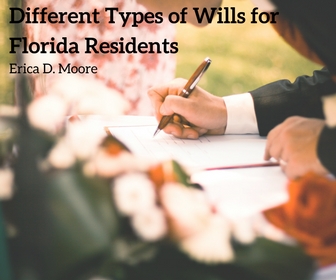
There are many different types of will, however only some are considered legally sound in the state of Florida. Your will is incredibly important, and one which is invalid can cause your family serious issues in the future. Anyone who is over the age of 18 and is compos mentis can make a will, but there are certain requirements that must be met in order for them to be lawfully recognized.
In order for a will to be considered valid, it must meet the following criteria:
- It has to be in writing
- It has to be signed by the testator as the end of the will, however some practice signing/initialing each page.
- It has to be in the presence of two witnesses. The witnesses must understand what the testator is doing and be able to observe the testator’s signature. There is no age constraint for the witnesses and they do not have to read the will.
- The testator has to sign the will in front of the witnesses, or make it known that he/she has signed the will before. The witnesses must sign after the testator and in front of one another.
Different Types of Wills
- Attested Will: This is a will that is written and signed by a testator, and is witnessed by two others. This is the most common type of recognized will in Florida, and can be:
- Simple: Which leaves property to a spouse and has only a few bequests
- Complex: A more detailed document with numerous bequests, some of which may have certain conditions
- Pour-Over: Similar to a simple will, it also details your request that property not in a trust will be put into a trust in the event of your death.
- Military Will: This will is legal on a federal basis, and is executed by the eligible person as stated. They are similar to an attested will, and are thus legally recognized in the state.
- Oral Will: This will is not in writing; rather it is orally given to another individual. This is not considered valid in Florida.
- Holographic Will: This will is handwritten and signed by a testator, much as the attested. However it is not signed by witnesses and is therefore not recognized by the state.
- Out-Of-State-Will: This can be judged as valid, given the correct conditions. The will may be considered legally valid if it is:
- In writing
- Valid in the jurisdiction in which it was completed
This type of will can apply even if said will does not comply with Florida’s requirements.
A will can still be contested for many reasons such as defective execution, forgery, undue influence and duress. If the will is contested, then the onus is on the party presenting the will to certify its legality. If the will is established as being legally correct, then it is the other parties’ responsibility to prove otherwise.